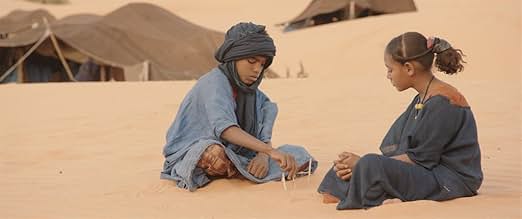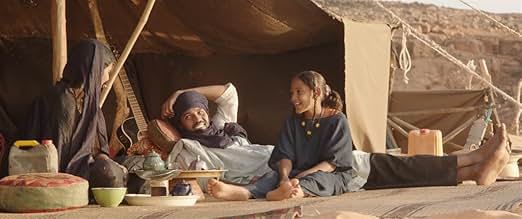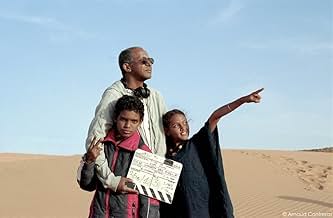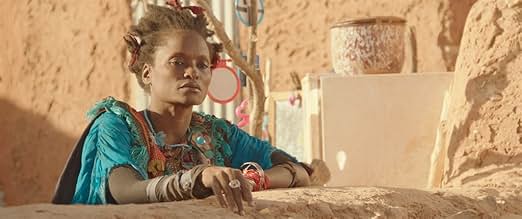IMDb-BEWERTUNG
7,1/10
18.754
IHRE BEWERTUNG
Das ruhige Leben eines in den Dünen von Timbuktu lebenden Hirten und seiner Familie wird durch Dchihaddisten umgeworfen, die fest entschlossen sind, den Glauben dieser Menschen zu kontrollie... Alles lesenDas ruhige Leben eines in den Dünen von Timbuktu lebenden Hirten und seiner Familie wird durch Dchihaddisten umgeworfen, die fest entschlossen sind, den Glauben dieser Menschen zu kontrollieren.Das ruhige Leben eines in den Dünen von Timbuktu lebenden Hirten und seiner Familie wird durch Dchihaddisten umgeworfen, die fest entschlossen sind, den Glauben dieser Menschen zu kontrollieren.
- Regie
- Drehbuch
- Hauptbesetzung
- Für 1 Oscar nominiert
- 33 Gewinne & 28 Nominierungen insgesamt
Ibrahim Ahmed
- Kidane
- (as Ibrahim Ahmed dit Pino)
Yoro Diakité
- Djihadiste
- (as Yoro Diakite)
Weli Kleïb
- Juge
- (as Weli Cleib)
Empfohlene Bewertungen
I don't believe there is one frame in this film that is not gorgeous, that couldn't be displayed as a photograph at a gallery. The muted colors of the desert, the medieval architecture of the town, the tragically expressive faces always glowing in a magical light--all of it is almost painfully beautiful. The story is beyond tragic. By seemingly digressing into numerous anecdotes illustrating the quirks of the population, the director allows us to appreciate deeply the texture and social fabric of the community that is being poisoned by madness. We see in particular its effect on an extremely appealing but by no means sanctified family. This is one of the film's extraordinary strengths as well. No character is oversimplified; even the appalling jihadists are granted their humanity. I've seen "Boyhood" and "Birdman", the apparent favorites for the Oscar. "Timbuktu" utterly blows both those fine movies out of the water.
"Timbuktu" is a brave film from Mauritania that shows what it's like in a small African town after it's been taken over by Jihadists determined to enforce Sharia Law. However, I should warn you--the film is far from enjoyable and seems rather hopeless and it also lacks the usual resolution you'd expect in a movie. This is not a criticism, as giving it a happy ending would have been ridiculous.
The film shows a variety of scenarios in which harsh Muslim law is implemented. Having fun of any type seems illegal--no singing, no music, no playing soccer...nothing. In addition, a man kills another man in self-defense and is brought to this tribunal...and his family is now left defenseless without a man to protect him.
Considering the film's pedigree, it is amazingly professional looking. The music is excellent and haunting, the acting very natural. Overall, a sad but intense drama that shows a slice of life...a very ugly slice.
The film shows a variety of scenarios in which harsh Muslim law is implemented. Having fun of any type seems illegal--no singing, no music, no playing soccer...nothing. In addition, a man kills another man in self-defense and is brought to this tribunal...and his family is now left defenseless without a man to protect him.
Considering the film's pedigree, it is amazingly professional looking. The music is excellent and haunting, the acting very natural. Overall, a sad but intense drama that shows a slice of life...a very ugly slice.
In the middle of the beauty of Saharian Africa, a shepherd and his lovely wife have to face the punishment of jihad's authorities in Timbuctu, a town in Mali. Religious authorities control even the most intimate gestures in the middle of crude poverty. A moral dictator, as usual conducts himself in double standard. Jihadism, persecutes not only sensual expressions such as the beauty of songs and music played by the people in the village, but also any expression of individuality. Amine Bouhafa's, music compositions are profoundly moving as also the sound of the original language, a soothing tender sound. The random of being born in such a place simply changes the life and options of the characters, leaving very little to free will.
On April 1, 2012, the National Movement for the Liberation of Azawad (MNLA) and the Al Qaeda linked Ansar Dine, took over Timbuktu in the African country of Mali, and placed it under Sharia law. Director Abderrahmane Sissako was born in his mother's country of Mauritania, but spent most of his life in Mali, his father's place of birth. Sissako's main goal in "Timbuktu," is to expose both the harsh rule of the Jihadists along with their hypocrisy.
Sissako begins his story with images of Africa animist statutes being machine-gunned (off screen) by the newly minted oppressors of Timbuktu. Sissako's Jihadists are not simply one-dimensional villains. The leader of the lot, Abdelkrim, hails from Libya and must utilize an interpreter to communicate his harsh vision of Islam. Despite his puritanical orders, Abdelkrim is not averse to talking shop about soccer (which is banned in the city) as well as smoking cigarettes.
Abdelkrim soon realizes that his local conscripts aren't as enthusiastic about Jihad than he is. He attempts to coach one of his local soldiers to fashion a propaganda message before a video camera but the young man just doesn't seem to be able to say things like he means it.
While the Jihadists drive around in SUV's with machine guns slung over their shoulders, the administration of Sharia law proceeds at a snail's pace. This is probably due to the slow paced nature of life in that part of the world to begin with. I was expecting brutal large scale massacres along the lines of ISIS in Syria or Iraq, but most of the jihadists' violent actions are selective: a woman receives lashes for singing and a couple is stoned to death for committing adultery.
Sissako doesn't focus a great deal of time in fleshing out his victims, although a couple of his characters hit the mark: the odd but interesting Haitian female shaman who isn't afraid to thumb her nose at her oppressors as well as a local Iman who attempts to reason with the jihadists over one of their soldiers taking a young girl as his bride against her wishes.
Sissako's main character who constitutes the main part of the narrative is Kidane, a local herder who lives out in the countryside with his wife and daughter. As A. O. Scott argues, "He is a symbol of decency and tolerance, of everything the extremists want to destroy, precisely because he is an intriguing, fully rendered individual." I'm not sure if I agree with Mr. Scott that Kidane is "full rendered," as Mr. Sissako goes out of his way to emphasize the character's saintliness a little too often (yes we do come to realize that Kidane's daughter does mean just about everything to him).
Kidane does have an Achilles heel and Sissako perhaps suggests that Kihane's thirst for revenge may be endemic in the culture. After a local fisherman kills one of his prize cows, Kihane goes to "talk" to him, carrying a gun (his wife warns him not to carry the gun, but he ignores her). Sure enough, the argument between the two turns into a killing-whether the shot that was fired occurred during the struggle or was intentional-is unclear. Kihane ends up before the Jihadi court but probably would have ended up in the same situation, no matter who was administering justice.
Some critics have suggested that Sissako's style is akin to Brecht. Certainly a good part of his strategy is to make his audience aware of social injustice and exploitation in a part of the world most westerners are not familiar with. If some of his characters seem a bit sketchy, that's because Sissako has fashioned more of a fable than docudrama. Under the veneer of Sissako's tragic landscape, the clarion call for freedom continues to resonate.
Sissako begins his story with images of Africa animist statutes being machine-gunned (off screen) by the newly minted oppressors of Timbuktu. Sissako's Jihadists are not simply one-dimensional villains. The leader of the lot, Abdelkrim, hails from Libya and must utilize an interpreter to communicate his harsh vision of Islam. Despite his puritanical orders, Abdelkrim is not averse to talking shop about soccer (which is banned in the city) as well as smoking cigarettes.
Abdelkrim soon realizes that his local conscripts aren't as enthusiastic about Jihad than he is. He attempts to coach one of his local soldiers to fashion a propaganda message before a video camera but the young man just doesn't seem to be able to say things like he means it.
While the Jihadists drive around in SUV's with machine guns slung over their shoulders, the administration of Sharia law proceeds at a snail's pace. This is probably due to the slow paced nature of life in that part of the world to begin with. I was expecting brutal large scale massacres along the lines of ISIS in Syria or Iraq, but most of the jihadists' violent actions are selective: a woman receives lashes for singing and a couple is stoned to death for committing adultery.
Sissako doesn't focus a great deal of time in fleshing out his victims, although a couple of his characters hit the mark: the odd but interesting Haitian female shaman who isn't afraid to thumb her nose at her oppressors as well as a local Iman who attempts to reason with the jihadists over one of their soldiers taking a young girl as his bride against her wishes.
Sissako's main character who constitutes the main part of the narrative is Kidane, a local herder who lives out in the countryside with his wife and daughter. As A. O. Scott argues, "He is a symbol of decency and tolerance, of everything the extremists want to destroy, precisely because he is an intriguing, fully rendered individual." I'm not sure if I agree with Mr. Scott that Kidane is "full rendered," as Mr. Sissako goes out of his way to emphasize the character's saintliness a little too often (yes we do come to realize that Kidane's daughter does mean just about everything to him).
Kidane does have an Achilles heel and Sissako perhaps suggests that Kihane's thirst for revenge may be endemic in the culture. After a local fisherman kills one of his prize cows, Kihane goes to "talk" to him, carrying a gun (his wife warns him not to carry the gun, but he ignores her). Sure enough, the argument between the two turns into a killing-whether the shot that was fired occurred during the struggle or was intentional-is unclear. Kihane ends up before the Jihadi court but probably would have ended up in the same situation, no matter who was administering justice.
Some critics have suggested that Sissako's style is akin to Brecht. Certainly a good part of his strategy is to make his audience aware of social injustice and exploitation in a part of the world most westerners are not familiar with. If some of his characters seem a bit sketchy, that's because Sissako has fashioned more of a fable than docudrama. Under the veneer of Sissako's tragic landscape, the clarion call for freedom continues to resonate.
For someone raised in Mauritania as I was, it was quite something to watch the first Mauritanian movie nominated for a Foreign Film Oscar. I saw it in, of all places, in a movie theatre in Rio de Janeiro, the first week of its release in Brazil.
The language of cinema is truly universal as you see people who belong to an entirely different culture react in a similar way to someone from that culture. Of course there are some references not easy to get, such as the one to music lauding the Prophet by Mauritanian female artist Dimi mint Abba which is heard in a key scene showing how absurd these Islamists' prohibitions are.
Unsure, also, whether people can tell when different actors use different languages (Arabic, Tuareg, Bambara etc.).
The soccer game scene is one of the best I saw this year on the big screen, and the one with the killing of astounding beauty.
Definitely a great director at work here, despite obvious limited resources.
The language of cinema is truly universal as you see people who belong to an entirely different culture react in a similar way to someone from that culture. Of course there are some references not easy to get, such as the one to music lauding the Prophet by Mauritanian female artist Dimi mint Abba which is heard in a key scene showing how absurd these Islamists' prohibitions are.
Unsure, also, whether people can tell when different actors use different languages (Arabic, Tuareg, Bambara etc.).
The soccer game scene is one of the best I saw this year on the big screen, and the one with the killing of astounding beauty.
Definitely a great director at work here, despite obvious limited resources.
Wusstest du schon
- WissenswertesIn 2015 Timbuktu became the first film shot in Mauritania by a Mauritanian director to win at the Cesar film awards. It won seven awards out of its eight nominations including Best Film, Best Director, Best Original Screenplay, Best Editing, Best Cinematography, Best Music and Best Sound, thus setting the record for being the African film with the most awards ever.
- PatzerIn the stoning scene, both man and woman are buried up to their necks. In a proper Islamic stoning (rajm), the woman should only be buried up to her waist.
- VerbindungenFeatured in The Oscars (2015)
- SoundtracksShooting The Statues
Composed, Arranged and Orchestrated By Amine Bouhafa
with The City of Prague Philharmonic Orchestra
© 2014 Universal Music France
Top-Auswahl
Melde dich zum Bewerten an und greife auf die Watchlist für personalisierte Empfehlungen zu.
- How long is Timbuktu?Powered by Alexa
Details
- Erscheinungsdatum
- Herkunftsländer
- Offizielle Standorte
- Sprachen
- Auch bekannt als
- Timbuktú
- Drehorte
- Oualata, Mauretanien (Islamische Republik)(as Timbuktu)
- Produktionsfirmen
- Weitere beteiligte Unternehmen bei IMDbPro anzeigen
Box Office
- Bruttoertrag in den USA und Kanada
- 1.076.075 $
- Eröffnungswochenende in den USA und in Kanada
- 45.110 $
- 1. Feb. 2015
- Weltweiter Bruttoertrag
- 7.179.391 $
- Laufzeit
- 1 Std. 36 Min.(96 min)
- Farbe
- Seitenverhältnis
- 2.35 : 1
Zu dieser Seite beitragen
Bearbeitung vorschlagen oder fehlenden Inhalt hinzufügen


























